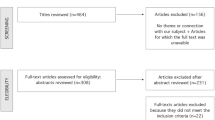Abstract
After reminding the main issues at stake in the famous Einstein–Bohr debate initiated in 1935, we tentatively propose a way to get them closer, thus shedding a new light on this historical discussion.
Similar content being viewed by others
Notes
Strangely enough, this experimental fact has been known all along, but the idea that the system’s properties should be defined independently from the context is so well entrenched that this plain fact has constantly been ignored. As we show here, its mere existence is decisive.
References
Aspect, A. (2015). Closing the door on Einstein and Bohr’s quantum debate. Physics, 8, 123.
Auffèves, A., & Grangier, P. (2016a). Contexts, systems and modalities: A new ontology for quantum mechanics. Foundations of Physics, 46, 121. arXiv:1409.2120.
Auffèves, A., & Grangier, P. (2016b). Violation of Bell’s inequalities in a quantum realistic framework. International Journal of Quantum Information, 14, 1640002. arXiv:1601.03966.
Auffèves, A., & Grangier, P. (2017). Recovering the quantum formalism from physically realist axioms. Scientific Reports, 7, 43365. arXiv:1610.06164.
Auffèves, A., & Grangier, P. (2018). Extracontextuality and extravalence in quantum mechanics. Philosophical Transactions of the Royal Society A, 376, 20170311. arXiv:1801.01398.
Bell, J. S. (1964). On the Einstein–Podolski–Rosen paradox. Physics, 1, 195.
Bohr, N. (1935). Can quantum-mechanical description of physical reality be considered complete? Physical Review, 48, 696.
Bohr, N. (1963). The unity of human knowledge. Essays 1958–1962 on atomic physics and human knowledge. Woodbridge: Ox Bow Press.
Einstein, A., Podolsky, B., & Rosen, N. (1935). Can quantum-mechanical description of physical reality be considered complete? Physical Review, 47, 777.
Grangier, P. (2002). Contextual objectivity: A realistic interpretation of quantum mechanics. European Journal of Physics, 23(3), 331. arXiv:quant-ph/0012122.
Laloë, F. (2012). Do we really understand quantum mechanics?. Cambridge: Cambridge University Press.
Acknowledgements
The authors thank Alexia Auffèves for continuous contributions, and Franck Laloë & Roger Balian for many useful discussions.
Author information
Authors and Affiliations
Corresponding author
Additional information
Publisher's Note
Springer Nature remains neutral with regard to jurisdictional claims in published maps and institutional affiliations.
Rights and permissions
About this article
Cite this article
Farouki, N., Grangier, P. The Einstein–Bohr Debate: Finding a Common Ground of Understanding?. Found Sci 26, 97–101 (2021). https://doi.org/10.1007/s10699-020-09716-7
Accepted:
Published:
Issue Date:
DOI: https://doi.org/10.1007/s10699-020-09716-7




